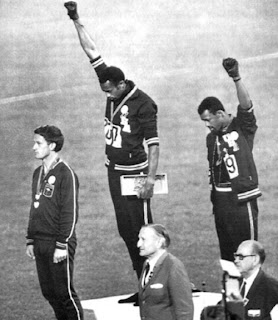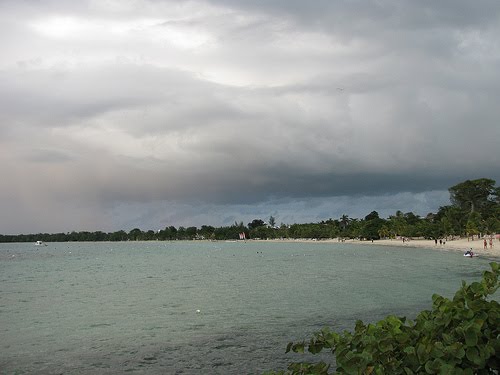At the time I’m writing this in June/July of 2012, every muscle of my middle aged body is aware that this is an Olympic year. Which means that if the TV network that airs the Olympics in the US doesn’t screw it up like in previous years, I will be transfixed and transported in front of the TV again, just as I was when I was a kid. To me nothing compares to the Olympics. There is no other sporting event, no post season madness, bowl game, or cup final that compares to the romance, heart and drive the Summer Olympics have for me. It’s where I learned things that school would never teach me. Sitting in front of my black and white TV as a 10 year old in 1968, I was there. The glow of the cathode ray tube may have been in South Philadelphia, but in ‘68 my soul was in Mexico City.
I lived with my mother and maternal grandparents. My older sister lived there too, but by that time she was either off at college or working somewhere. And since my mother worked two jobs to support us all, I watched all TV, including the ’68 Olympics, either by myself or with my grandfather, a former boxer. Whenever boxing was on, Olympics or not, and especially when there were black boxers fighting, like the then 19 year old George Foreman who won the gold medal that year fighting a Russian, my grandpop watched. And during the middle of that James Bond / Man From U.N.C.L.E., cold war era of ‘68, as George stood tall, my grandpop cheered, even though he could barely see the bouts. My grandpop was then blind in one eye and had bad sight in the other, so he watched our TV with his face inches from the screen. And still he couldn’t see clearly. Watching boxing with grandpop sounded something like this:
“Hey, is he black?”
“Yes grandpop, he’s black.”
“And what about that guy?”
“No he’s from Poland – not black.”
“Are you sure? Play with that knob on the side again.”
“I can play with the contrast knob all day grandpop, but the Polish guy is not black.”
Even though my Mexico City Olympic experience was seen from an acute angle in order to see around my grandpop, whose forehead kissed the screen, I was still transported.
“Yes grandpop, he’s black.”
“And what about that guy?”
“No he’s from Poland – not black.”
“Are you sure? Play with that knob on the side again.”
“I can play with the contrast knob all day grandpop, but the Polish guy is not black.”
Even though my Mexico City Olympic experience was seen from an acute angle in order to see around my grandpop, whose forehead kissed the screen, I was still transported.
 |
| Jim Hines winning the 100m dash. |
 |
| And that other guy? Australian Peter Norman won silver and on the podium wore the badge for the Olympic Project for Human Rights. He was left off the 1972 Australian team. |
This was a relationship with water that I knew nothing about. That one could be on the highest part of the earth, essentially be a part of the sky, and fling themselves elegantly into the waiting arms of the water below. I know that I could never judge such a competition. It would be like grading prayer. How does one measure individual skill, wrapped so tightly in faith, belief and the wisdom of knowing how to navigate so quickly through the worlds of earth, sky and water. “You get the gold, you get the silver, and you the bronze.” Yeah, whatever. At 10 years old in 1968 I learned that success sometimes means taking a leap, falling with grace, and even with a tiny splash, celebrating life.




6 comments:
Riveting and beautiful Thanks!
Thank you. I was an 8th grader that fall and remember being chocked that the athletes had the guts to raise their fists. I can still remember the "gulp" of the broadcasters as they 'dealt' with this situation. It is an indelible image for me, too. The more I looked at the picture - which was plastered over every newspaper page and news magazine - the more I thought: "such a fuss over nothing. They did nothing to dishonor their country. They were the best that they could be and at that time, it meant the best in the world. And THEN... they showed people that in America, we stand up for what we believe in AND we have the right and power to protest." To a 13 yr old, it was an image that said "raising your fist for what you believe in is a GOOD thing. And I do think that in Current Events that fall in my all-white Roman Catholic suburban school, I said "they were right to do this" Powerful then, powerful now. Thanks for sharing. And I had forgotten about that high cliff diving... thanks for sharing that, too.
Thank you. I was an 8th grader that fall and remember being chocked that the athletes had the guts to raise their fists. I can still remember the "gulp" of the broadcasters as they 'dealt' with this situation. It is an indelible image for me, too. The more I looked at the picture - which was plastered over every newspaper page and news magazine - the more I thought: "such a fuss over nothing. They did nothing to dishonor their country. They were the best that they could be and at that time, it meant the best in the world. And THEN... they showed people that in America, we stand up for what we believe in AND we have the right and power to protest." To a 13 yr old, it was an image that said "raising your fist for what you believe in is a GOOD thing. And I do think that in Current Events that fall in my all-white Roman Catholic suburban school, I said "they were right to do this" Powerful then, powerful now. Thanks for sharing. And I had forgotten about that high cliff diving... thanks for sharing that, too.
Kevin, brilliant stuff! I was too young to remember the 1968 Olympics, as I was only 4, but I remember that the Olympics were always a big deal for us, as a family. As was Wimbledon, although I never REALLY got into that until I was older. T.V. in the UK for the Olympics was always good. EVERYTHING was shown no matter who was competing, or not competing. When I first came over her I missed the Olympics! Well, that's not true as it was Atlanta, but from what I saw only the Americans were competing!
And one thing I also watched avidly, was the rock diving. It was insane. Such skill and talent to be able to judge the swell of the tide and the time to 'fly' to hit the water near or at its peak! My heart was always in my mouth with that! It made diving off the concrete 30 feet board at the town pool look like roll diving off the edge of a hotel pool!
1968 - A year that gave us much to think about and then changed the course of our history in November.
I didn't see much of the Olympics on the black and white TV in the dorm lounge at a small colege in central IL. But I remember the pictures of the runners with their raised fists. And I cheered for them, and their right to stand up for what they believed.
Another powerful, inspiring story-thanks.
Post a Comment